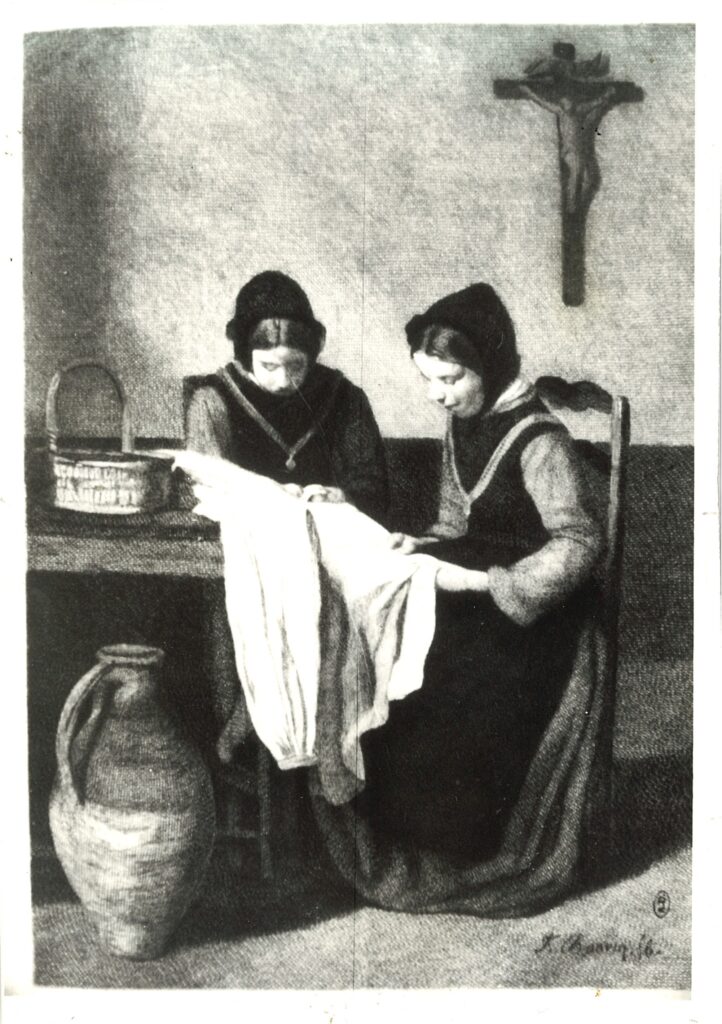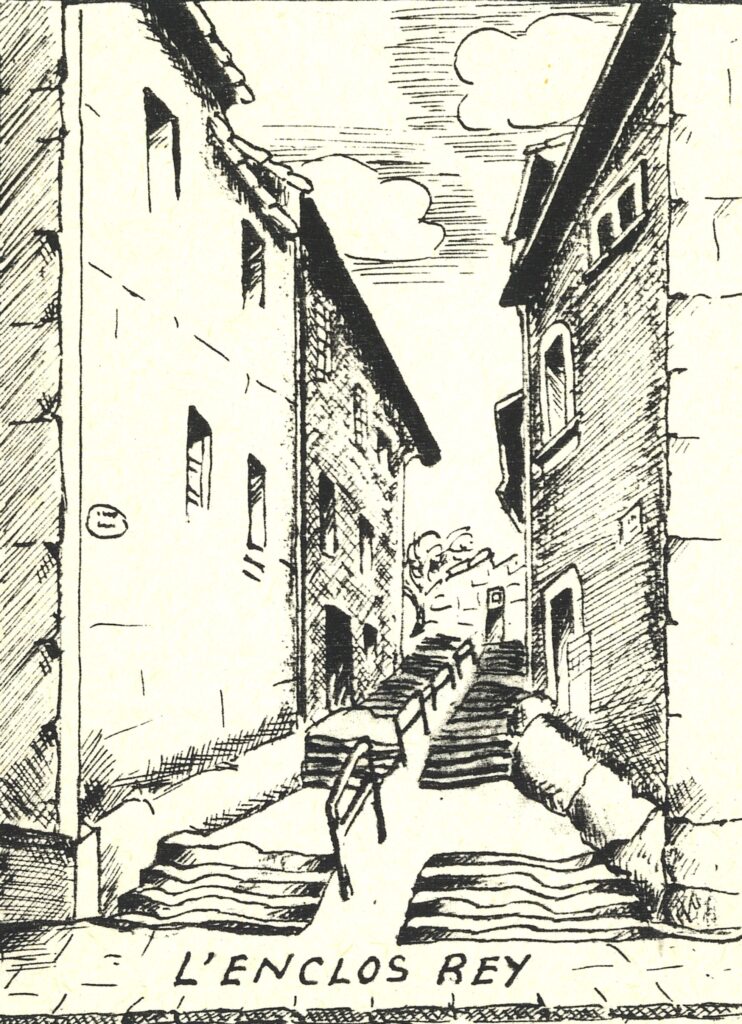A double birth: Etienne Pernet and Antoinette Fage.(1/3)

This article paints a double portrait of
Etienne Pernet and Antoinette Fage. It was written on the occasion of the bicentenary
of their birth. It will be published in three parts on this website, the first
of which covers the early years of their lives up until 1864.
200 years ago, in 1824, Etienne Pernet and Antoinette Fage were born. Later on in their lives, they founded the Little Sisters of the Assumption. Their spiritual friendship and their individual personalities led them to put into practice the initial intuition of Father Pernet, with the objective to ‘procure the glory of God through the salvation of the poor and the little ones’.
————————-
A modest childhood
23rd of July 1824. In a Franche-Comté village called Vellexon, a boy was born and baptised the next day as Claude Etienne. Franche-Comté was a rural area at the time, and Claude Etienne’s father, Claude Pernet, was both a farmer and a miner in an iron mine. Over the years, the family grew with 7 children, of whom only 4 reached adulthood. Both father and mother, Madeleine Cordelet, were renowned in the village for their honesty. The family members were very fond of each other, especially Etienne and his mother.
Antoinette was born a few months later, on the 27th of November. Unlike Etienne, she grew up in an urban context, in a Paris that was just about to undergo Baron Haussmann’s great transformations. Nonetheless, similarly to Etienne, she came from a modest background: her mother was a linen maid and her father, whom she never knew because he left the home when she was born, was a soldier.
Her childhood seems to have been marked by a succession of hardships: she lost her grandmother, followed by her mother when she was 13 years old. In addition to that, following a fall that was poorly treated, she was left crippled and short. After her mother’s death, she was taken in by neighbours, and as she did not want to be a burden on them, she worked as a linen maid.

The religious background
Antoinette’s family was not particularly religious. Nonetheless, she was christened a few days after her birth and she made her Holy Communion. Before her mother died, she went to school with nuns and joined a group of Children of Mary.
Etienne, on the other hand, was brought up in a deeply Catholic environment and, ever since his catechism school days, he felt the call to become a priest.
He also experienced bereavement at a very young age: his father died in 1838, causing the family to become progressively poorer. Madeleine Cordelet, the village midwife, had to work twice as hard to support the household by herself. However, she preferred to encourage young Etienne, who was 14 at the time, to study, and so he went through all the stages leading to the priesthood at the time (junior school, minor seminary and major seminary).
Inner search
But Etienne had doubts. Not about his faith, which remained deep, but about his vocation. He had very high ideas of the priesthood and, as he would later confide to witnesses, he was frightened by the responsibility for souls and feared the isolation of the secular clergy. So, after much thought and prayer, he left the Besançon seminary. He was 20 years old and found himself totally destitute, not wanting to be a burden on his mother. After a few years as a supervisor and then tutor in Dôle, in the Jura, he left for Paris to look for work, following the example of many young rural people of his time. There, he was fortunately welcomed by a cousin who agreed to put him up. But Etienne fell seriously ill. He also prayed a lot and often went to Notre-Dame des Victoires in search of his vocation.
Finally, a priest introduced him to Mother Marie-Eugénie de Jésus, founder of the Religious of the Assumption. Mother Marie-Eugénie sent him to Father d’Alzon in Nîmes:
“I rather like this young man, he seems intelligent, dynamic (…) and I think he has what it takes for the good, with a lot of natural ardour (…). To me, his present desire seems sincere.”
Father d’Alzon knew Mother Eugénie’s sound judgement and immediately replied, “Send him to me”.
In 1849, when Etienne arrived in Nîmes to join Père d’Alzon, Antoinette left her adoptive family to join a dressmaking workshop.
In this workshop, where honest and poor girls were employed, she was in her element. The accounts of this period all emphasise Antoinette’s generosity. Sabine Bernard, for example, the daughter of her landlady, wrote: “All the money she earned was used to help young women who were suffering misery in their households”.
She also lived a life of prayer, attending Sunday services and daily Mass in the morning before her day’s work. She joined the Association Notre-Dame de Bon Conseil, one of the first patronages in Paris, a charitable organisation that visited poor families, gave them vouchers for bread or meat, and even made personal donations. To this end, Antoinette worked even harder and deprived herself of fire.
It was through the Dominicans that she met the Mesnard ladies, a mother and daughter, both Dominican tertiaries, who were planning to open a small orphanage for young girls. Antoinette became the director in 1861.
Nîmes and Paris
Etienne went to Nîmes to become a supervisor at the middle school that Father d’Alzon had been running for five years. He gained everyone’s sympathy and was held in high esteem by his pupils, even though he didn’t feel very comfortable in this role. Let us re-read the account given by one of his former pupils, Abby H.D. Galeran, in the Souvenirs (Memories) journal published shortly after Father Pernet’s death (in July 1899):
“His sympathetic exterior, the very sound of his gentle voice, his charming shyness; then, little by little, the knowledge of his good heart, everything about him inspired our vibrant affection. We avoided causing him the slightest pain, which, on the part of pupils towards a supervisor, is simply heroic.”
And Father d’Alzon wrote to Mother Eugénie in June 1849:
“I am very satisfied with Monsieur Pernet (…). Thank you for sending him to me. I notice in him openness, frankness, goodwill, a serious and clear mind, little imagination, but I have the impression that he is a brave man.” Nonetheless, because of his shyness, lack of confidence and lack of interest in teaching, these were difficult times for the young man. He would later say that these were “years of suffering”.
He entered the novitiate of the Augustinians of the Assumption in October 1849, only four months after his arrival in Nîmes.
After taking his first vows on Christmas Day 1850, he continued his training and was ordained a priest in Le Mans in 1858. It was during his time as a young religious that Etienne, who was in charge of teaching, was also in charge of an oratory that brought together around 200 children from working-class backgrounds. It was there, as he would later testify, that he discovered what he called the ‘worker’s sickness’, in both its material and spiritual dimensions, and received the shock that would later lead him to found the congregation of the Little Sisters of the Assumption

Etienne was then sent to various places, including Clichy and Nîmes, but this was still a difficult time for him. He felt unsuited for the tasks assigned to him (supervising pupils, teaching, bursar’s office, etc.). His health suffered and remained precarious, while on top of this, his mother was in great financial difficulty, which worried him greatly. Finally, in 1863, he was sent to Paris, to the community in the rue François 1er, where he remained for the rest of his life.
For Antoinette, this period marked her work as director of the orphanage run by the Dames de Mesnard. She also joined the Dominican Third Order.
From the outset, she endeared herself to the young people in her care. Beneath her frail exterior, she was cheerful and full of energy. Mlle Pétard, a member of the Dominican Third Order, later wrote of her: “During the few years I spent in her company, I enjoyed her cheerfulness, her even-temperedness and her excessive kindness (…) It was impossible to get bored around her; there was no monotony around her”.
The Mesnard ladies valued their collaborator, but they held on to their authority and were jealous of the trust that Antoinette inspired in the young people. This led to a delicate situation that lasted for over a year.
It is against this backdrop that Etienne and Antoinette met.
